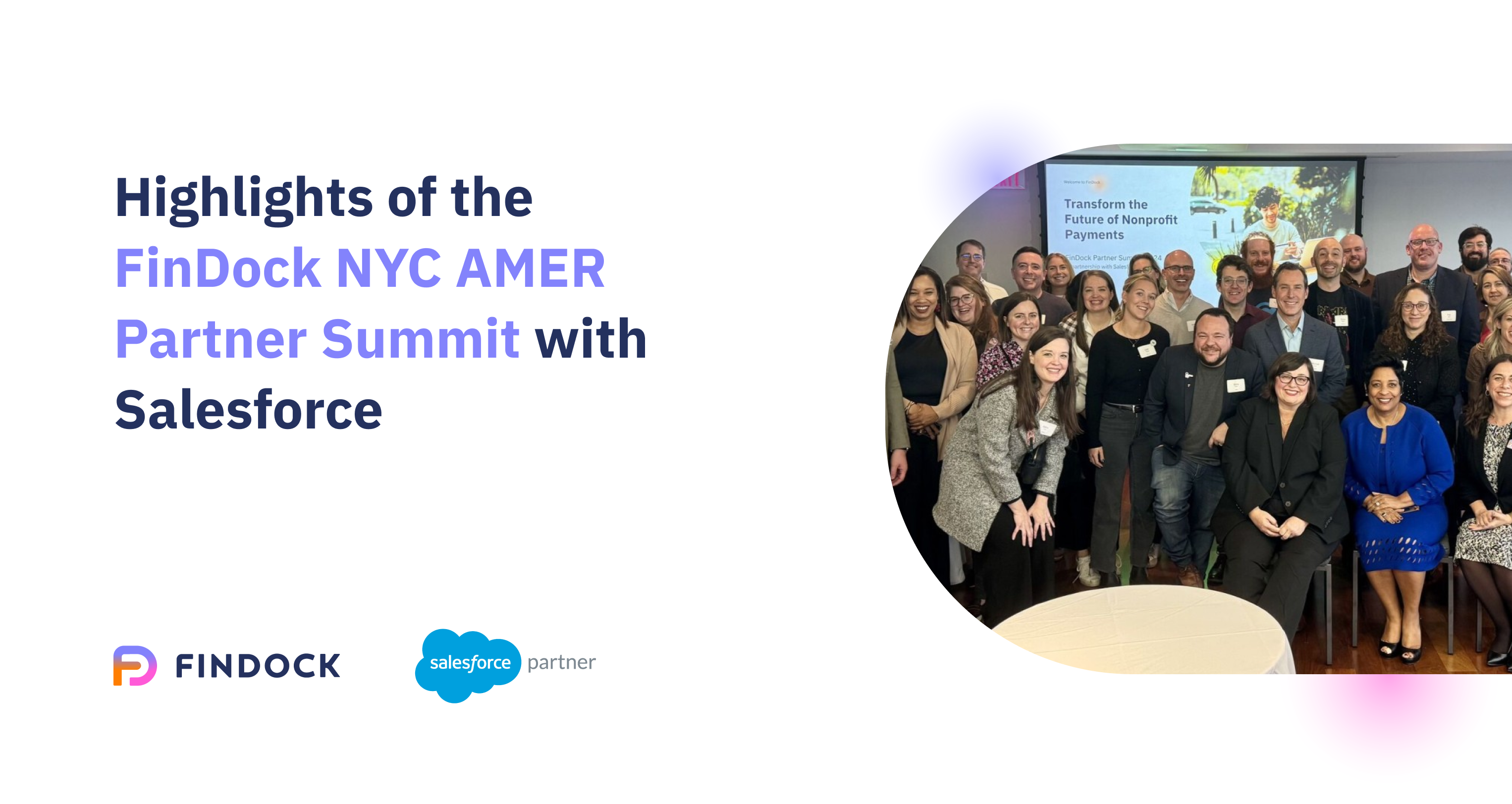In November 2024, we had the privilege of hosting over 60 of our AMER partners to explore the future of nonprofit payments. The event was a fantastic opportunity to engage with incredible minds, discuss how technology can empower nonprofits, and connect with the Salesforce Nonprofit Leadership team.
Our very own Jessica Hood has shared three key takeaways from this insightful day—let’s dive in!
𝗔𝗴𝗲𝗻𝘁𝗳𝗼𝗿𝗰𝗲: 𝗥𝗲𝘃𝗼𝗹𝘂𝘁𝗶𝗼𝗻𝗶𝘇𝗶𝗻𝗴 𝗡𝗼𝗻𝗽𝗿𝗼𝗳𝗶𝘁 𝗦𝗼𝗹𝘂𝘁𝗶𝗼𝗻𝘀
The Summit highlighted Agentforce’s potential to transform how nonprofits leverage technology. By creating sophisticated, AI-driven solutions, Agentforce is extending the capabilities of the Salesforce platform in remarkable ways. Some standout examples demonstrate the profound impact of this technology on its own and with FinDock. Imagine agents who can:
- Streamline complex payment matching, saving valuable time for development operations teams
- Support donors in increasing their recurring contributions
- Provide autonomous 24/7 support for critical services like emergency food, housing, and disaster relief
- Automatically answer volunteer questions, schedule shifts, and generate impact reports
These innovations are not just technological improvements; they’re game-changers for organizations seeking to maximize their impact.
𝗗𝗶𝗿𝗲𝗰𝘁 𝗠𝗮𝗶𝗹: 𝗥𝗲𝗶𝗺𝗮𝗴𝗶𝗻𝗲𝗱, 𝗡𝗼𝘁 𝗗𝗲𝗮𝗱
Despite predictions of its demise, direct mail remains a top revenue source for many nonprofits. However, traditional direct mail strategies often struggle with data segmentation and reporting. Salesforce is changing this narrative.
During the summit, Dustin K. Pitts and Justin Gilmore unveiled groundbreaking innovations in Nonprofit Cloud’s direct mail capabilities. The key highlights include:
- Real-time, data-driven mail segmentation for business users
- Integration with FinDock to process gifts directly within Salesforce
- Innovative approaches to bridging offline and online donation experiences
FinDock’s solution bring gift processing inside Salesforce allowing organizations to enable:
- Personalized QR codes that link direct mail responses to specific campaigns, source codes and segments
- Seamless gift entry and ACH processing
- Options for donors to make additional one-time donations against a stored card – ideal for current Sustainers
- Automated check processing and reconciliation
- Lockbox file processing that automatically creates and links donation records
𝗦𝘁𝗿𝗮𝘁𝗲𝗴𝗶𝗰 𝗜𝗻𝘀𝗶𝗴𝗵𝘁𝘀 𝗳𝗿𝗼𝗺 𝘁𝗵𝗲 𝗘𝘅𝗲𝗰𝘂𝘁𝗶𝘃𝗲 𝗣𝗮𝗻𝗲𝗹
The executive panel, featuring Salesforce’s nonprofit industry leaders Kimberly (Smith) Bradberry, Lori Freeman, Michael Force and Chris Biggs, offered critical insights into preparing for the Agentforce era. Their advice centered on three key data strategy considerations:
- 𝗨𝗻𝗶𝗳𝗶𝗲𝗱 𝗗𝗮𝘁𝗮 𝗦𝗼𝘂𝗿𝗰𝗲𝘀: Ensure that all data is consolidated into a single, accessible source for AI agents.
- 𝗗𝗮𝘁𝗮 𝗚𝗼𝘃𝗲𝗿𝗻𝗮𝗻𝗰𝗲: Develop comprehensive acceptable use policies. Many organizations lack clear guidelines for data management, making it crucial to establish robust governance frameworks.
- 𝗔𝗜 𝗣𝗼𝗹𝗶𝗰𝘆 𝗗𝗲𝘃𝗲𝗹𝗼𝗽𝗺𝗲𝗻𝘁: Create a structured approach to AI implementation. While CIOs are excited about AI’s potential, a thoughtful policy that addresses risk mitigation and usage guidelines is essential.
𝗧𝗵𝗲 𝗖𝗼𝗹𝗹𝗮𝗯𝗼𝗿𝗮𝘁𝗶𝘃𝗲 𝗙𝘂𝘁𝘂𝗿𝗲 𝗼𝗳 𝗡𝗼𝗻𝗽𝗿𝗼𝗳𝗶𝘁 𝗧𝗲𝗰𝗵𝗻𝗼𝗹𝗼𝗴𝘆
The FinDock Partner Summit exemplifies a new model of technological innovation—one built on partnership, flexibility, and shared vision. By bringing together Salesforce, system integrators, FinDock, and nonprofit organizations, we’re creating an ecosystem that can rapidly adapt to changing needs.
This collaborative approach isn’t just about technological advancement. It’s about empowering organizations to work more efficiently, reach more people, and create greater impact in their communities.
As we look to the future, one thing is clear: the most powerful solutions will emerge from strategic partnerships that prioritize innovation, accessibility, and human-centered design.
